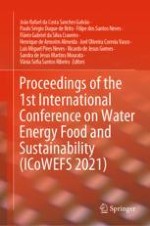2021 | OriginalPaper | Buchkapitel
Evaluation of Chemical Impacts of Rice Irrigated with Urban Treated Wastewater
verfasst von : Isabel Maria Duarte, Ana Rita Cardoso, Helena Marques, Filipe Melo, José Borralho, Paula Amador, Kiril Bahcevandziev, Teresa Vasconcelos, José M. Gonçalves, Mário Pina Barreto
Erschienen in: Proceedings of the 1st International Conference on Water Energy Food and Sustainability (ICoWEFS 2021)
Aktivieren Sie unsere intelligente Suche, um passende Fachinhalte oder Patente zu finden.
Wählen Sie Textabschnitte aus um mit Künstlicher Intelligenz passenden Patente zu finden. powered by
Markieren Sie Textabschnitte, um KI-gestützt weitere passende Inhalte zu finden. powered by
